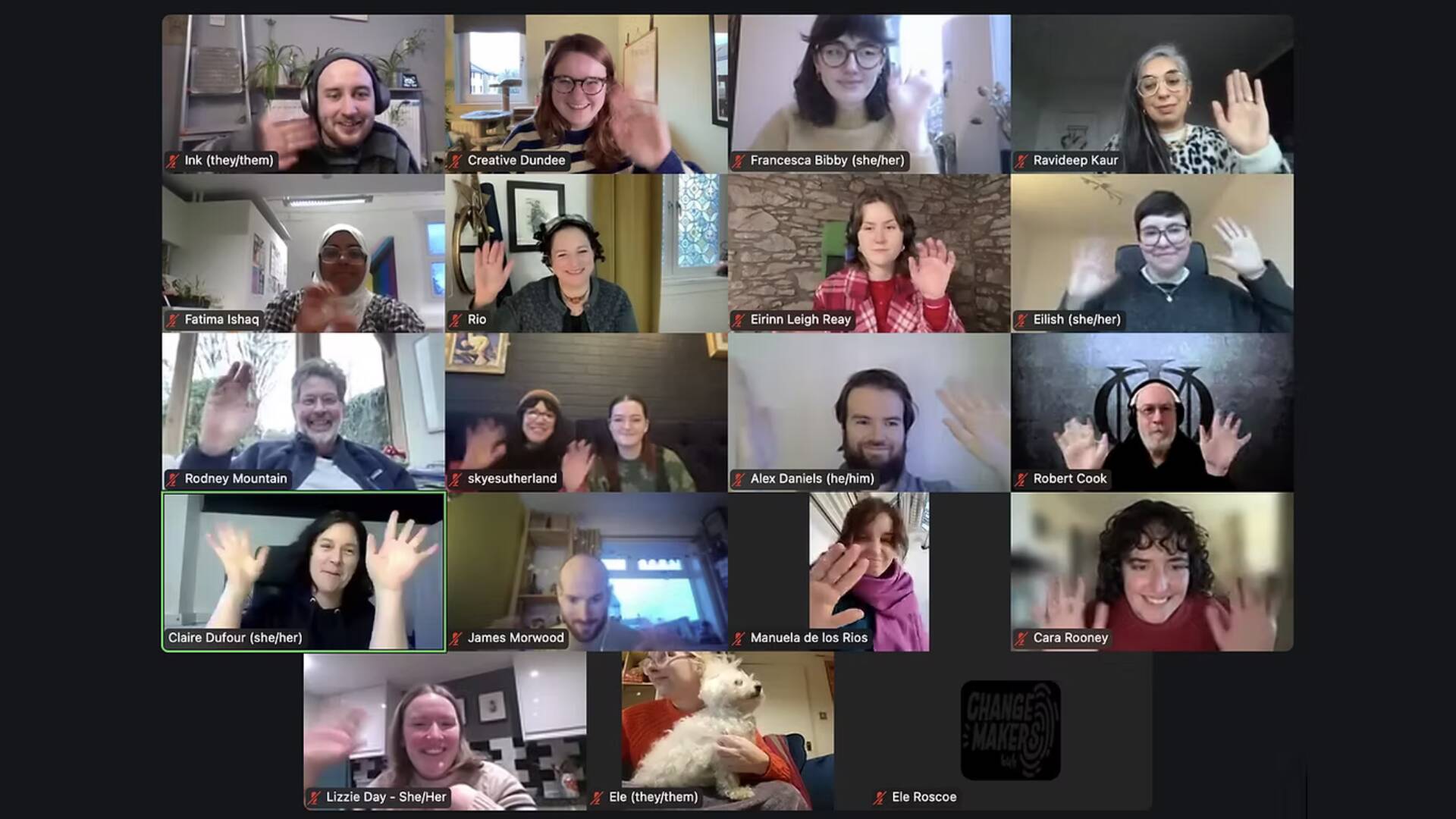
13.02.25

Alongside Dundee’s Changemakers Hub, we’re delighted to bring back Fabric – an informal peer-learning journey to share, reflect and imagine how collective action can shape a better tomorrow.
Bringing together creative practitioners and community organisers, this iteration of Fabric will focus on community climate action, giving participants the knowledge, skills, confidence and connections to fuel future work or projects.
In this blog originally shared with Dundee’s Changemakers Hub, Fatima Ishaq takes us through the second session, ‘Bring a Chair, Create the Table’, and reflects on her experience of a packed online session exploring activism, anti-racism and disability justice.
‘Bring a chair, create the table’ was the topic of our second Fabric session, but what does it actually mean?
For me, it means showing up, being present, and making space for each other – it means creating a safe space to chat about what’s important to us, to reflect on our values, and visualise our shared goals for the future. This was very much the tone of our session, which touched on activism, anti-racism and disability justice.
We started the session off with an icebreaker, which (in my opinion) has got to be a necessity for a zoom call! The prompt was naming one of our favourite things about Dundee. As you can imagine, common answers included the community feel, the people, the togetherness, how close everything is, being close to the water (and the peaceful hills!), being in a central position geographically – the list can go on and on! It was refreshing to be in a space where there was so much love for our wee city (or ‘village’ as I call it), especially amidst all the challenges we face in our community. As someone on the day said “people are so loud about what they care about in Dundee” and I could certainly feel this in the room throughout as well.
So, after we got comfortable in the digital space, I had the privilege of chatting away about my activism journey. We talked about building caring communities, showing solidarity (sometimes it’s not about listening to respond but simply standing alongside), and the importance of reflexivity and celebrating the small wins amongst a lot of ‘waffle’, as I like to call it. We then spent some time reflecting on our own activism – thinking about what resources you may need (a cup of coffee and a pen always works for me!), and encouraging people to reflect on what they want to say and what helps them be heard.
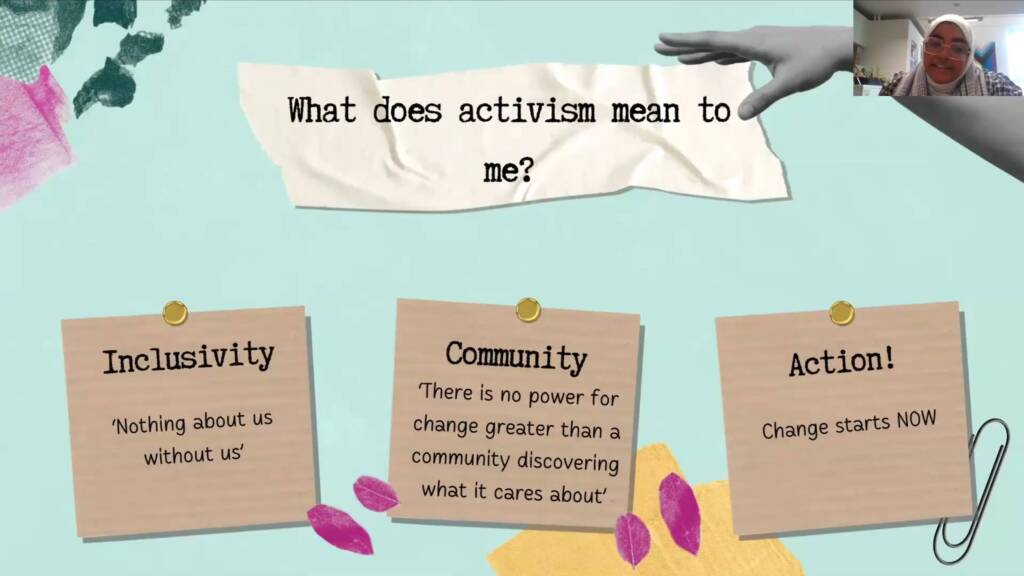
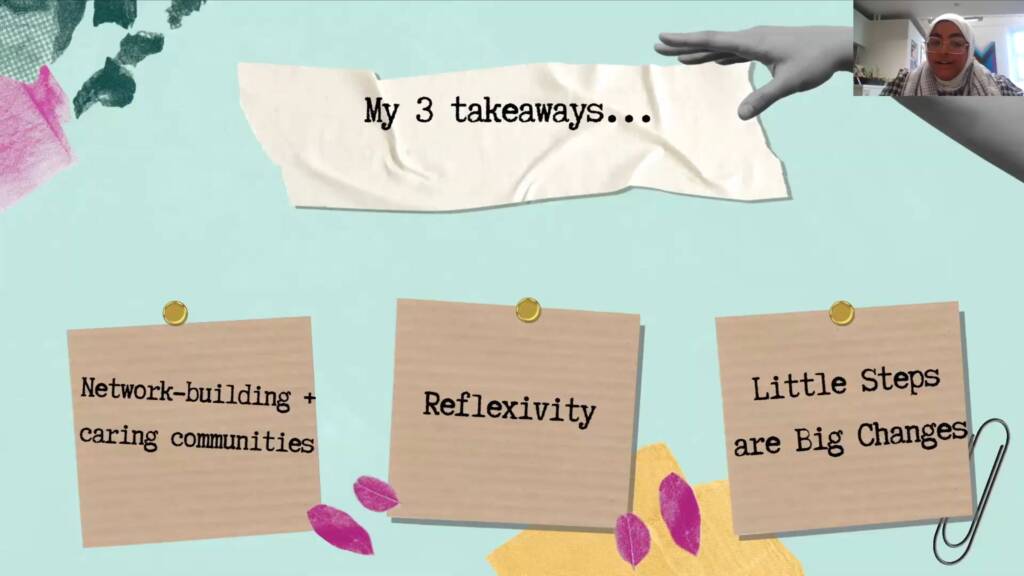
Following on from this, we had an absolutely fantastic session with the brilliant Briana Pedago. Briana did an exercise with us allowing us to create a ‘values compass’ – using question prompts to enable us to identify and reflect on our core values and share these in a safe and contained space. I was relieved when doing the exercise and found that my values seemed to be aligned with what I imagined. This is a perfect tool as a ‘sense-check’ when making decisions, and I’ve kept my values compass close-to-hand ever since.
Briana continued to talk about topics like intersectionality and the importance of centring lived experience voices and facilitating meaningful participation, drawing on Arnstein’s Ladder of Citizen Participation (a useful tool we had looked at previously).
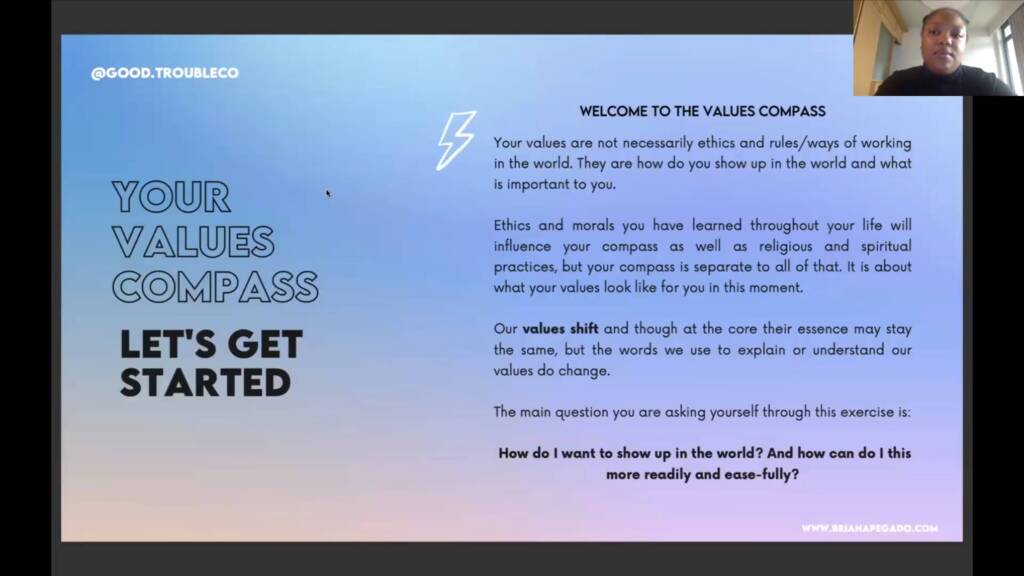
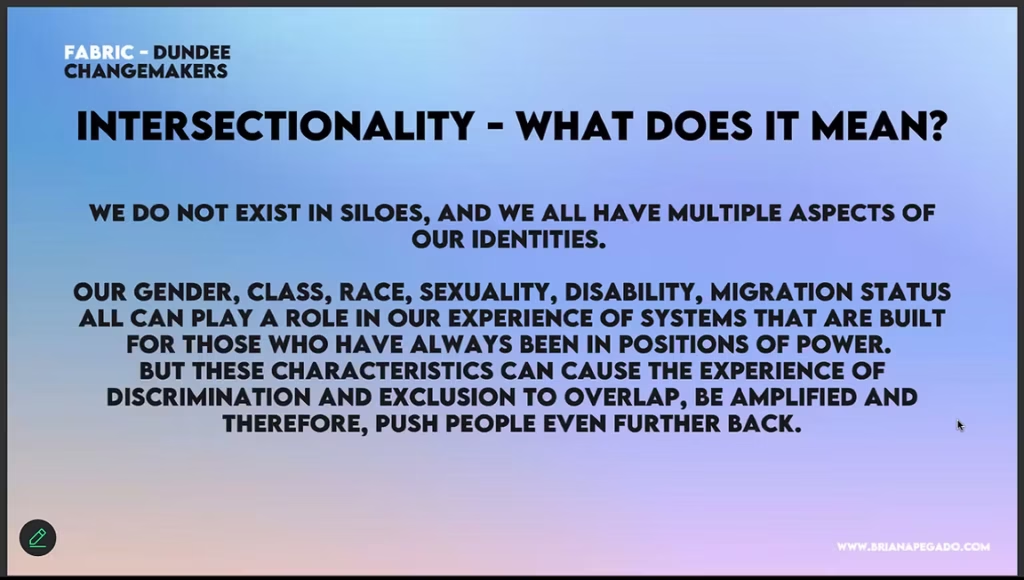
‘What do you need to activate your activism?’ – this was a fitting question to end the morning session, and an excellent question to ponder over lunch.
A lunch break on a digital space can be strange, but I took the opportunity to have a quick power nap to really soak up the knowledge (and I’d like to think I wasn’t the only one).
After lunch, it was time for a packed session with Ink. Keeping the energy up and momentum going after lunchtime is a challenge, especially when operating in a digital space, but Ink made sure to keep us engaged, gently.
We started the session with a newfound favourite activity of mine – Ink encouraged us to take 10 minutes off camera to create the most comfortable space we could in the area we were in and with the resources we had. I immediately went outside and spent 10 minutes in the beautiful winter sun – this was a definite energy booster and got me hooked for the rest of the session.
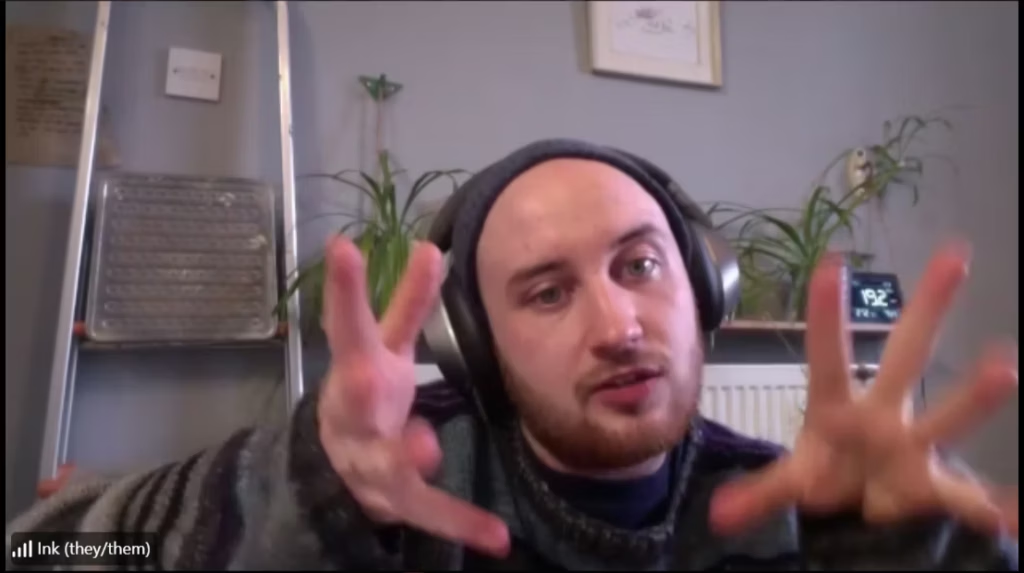
This exercise emphasised the uniqueness of everyone – we all have different needs, and there’s an infinite number of different needs that will always be situation dependent. This got me thinking about accessibility, and whether a space can always truly be fully accessible for everyone. Again, making me reflect on my perceived value of inclusion – what does inclusion look like? Can a space be absolutely inclusive? Is inclusivity relative?
We spent the afternoon diving into disability justice, we talked about access and created space to reflect on the history of disabled people organising and engaging in direct action, and we reflected on what we would want to ask these activists today, all of which was certainly inspiring.
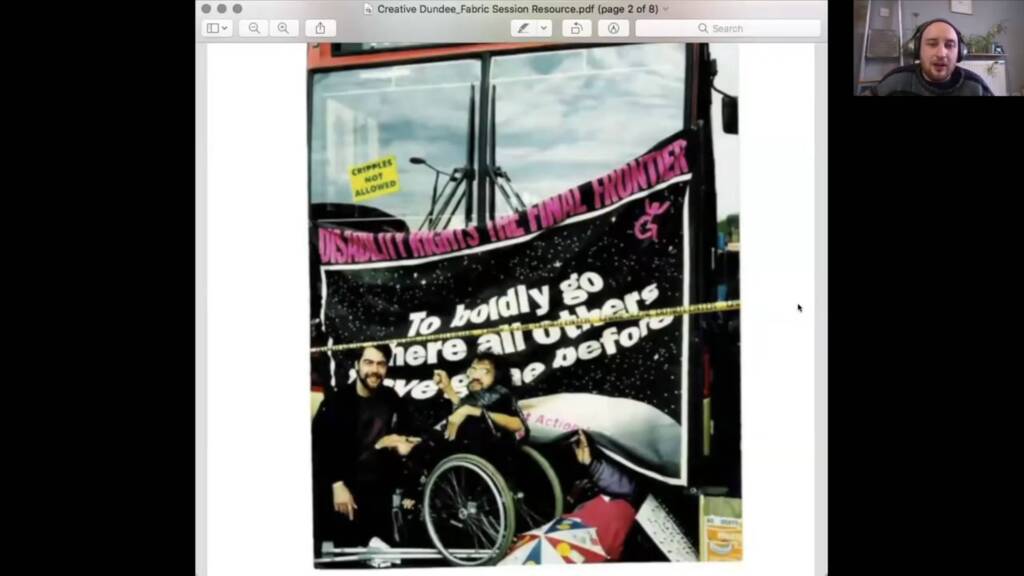
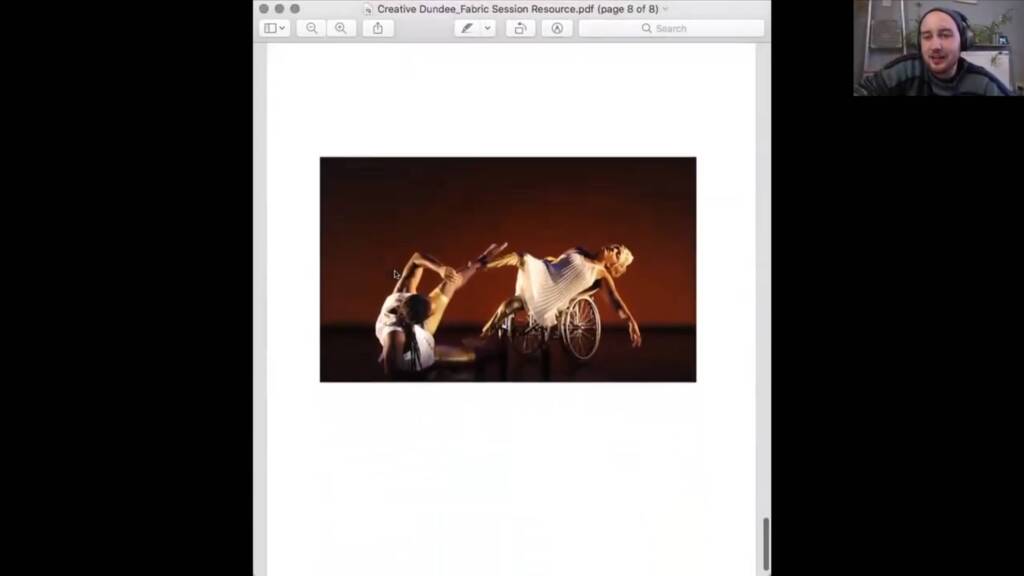
Finally, we looked at Sins Invalid’s 10 Principles of Disability Justice and took some time to reflect on these.
I have since been thinking a lot about this particular principle:
COLLECTIVE ACCESS: As brown, black and queer-bodied disabled people we bring flexibility and creative nuance that go beyond able-bodied/minded normativity, to be in community with each other.
I have been drawn to this principle as I feel it is rooted in the idea of creating a safe space for everyone – recognising intersectionality and our unique identities – and one which challenges the norms set by a society that is designed mainly for able-bodied/minded people.
This principle gives me hope; hope to create more supportive communities that recognise that interdependence is vital, as well as creative thinking, and a more radical approach to inclusivity.
And just like that the day was over! This was such a wonderful session, and I feel as a group we were able to foster a very safe and supportive space, and able to reflect lots on our values and experiences and connect with these on a deeper level. This session has given me lots of ideas, confidence and a spark to take action, and I can’t wait to see what session 3 and 4 will bring too!
Fatima Ishaq is a student, youth worker and activist; passionate about social justice, supporting others to reach their potential, and supporting communities to drive change. In her spare time, she loves exploring and connecting with nature!
Dundee’s Changemakers Hub is being designed and delivered by a collective of five local community organisations: Transition Dundee, The Maxwell Centre, ScrapAntics, Uppertunity, and Creative Dundee. The Hub will offer support, events, workshops and micro-grants to connect and amplify collective community action.
The Hub is part of a growing national network of Climate Action Hubs funded by the Scottish Government’s Climate Action Fund, which aim to build local awareness of the climate emergency, develop local plans, help groups take up funding opportunities, and contribute to a Just Transition.

If you would like to support us in creating even better content, please consider joining or supporting our Amps Community.